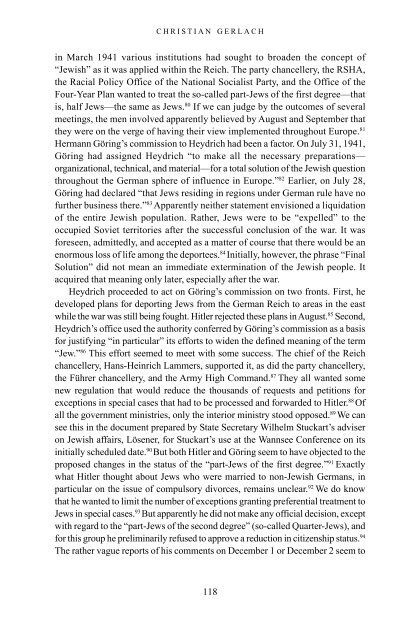The_Holokaust_-_origins,_implementation,_aftermath
The_Holokaust_-_origins,_implementation,_aftermath
The_Holokaust_-_origins,_implementation,_aftermath
Create successful ePaper yourself
Turn your PDF publications into a flip-book with our unique Google optimized e-Paper software.
CHRISTIAN GERLACH<br />
in March 1941 various institutions had sought to broaden the concept of<br />
“Jewish” as it was applied within the Reich. <strong>The</strong> party chancellery, the RSHA,<br />
the Racial Policy Office of the National Socialist Party, and the Office of the<br />
Four-Year Plan wanted to treat the so-called part-Jews of the first degree—that<br />
is, half Jews—the same as Jews. 80 If we can judge by the outcomes of several<br />
meetings, the men involved apparently believed by August and September that<br />
they were on the verge of having their view implemented throughout Europe. 81<br />
Hermann Göring’s commission to Heydrich had been a factor. On July 31, 1941,<br />
Göring had assigned Heydrich “to make all the necessary preparations—<br />
organizational, technical, and material—for a total solution of the Jewish question<br />
throughout the German sphere of influence in Europe.” 82 Earlier, on July 28,<br />
Göring had declared “that Jews residing in regions under German rule have no<br />
further business there.” 83 Apparently neither statement envisioned a liquidation<br />
of the entire Jewish population. Rather, Jews were to be “expelled” to the<br />
occupied Soviet territories after the successful conclusion of the war. It was<br />
foreseen, admittedly, and accepted as a matter of course that there would be an<br />
enormous loss of life among the deportees. 84 Initially, however, the phrase “Final<br />
Solution” did not mean an immediate extermination of the Jewish people. It<br />
acquired that meaning only later, especially after the war.<br />
Heydrich proceeded to act on Göring’s commission on two fronts. First, he<br />
developed plans for deporting Jews from the German Reich to areas in the east<br />
while the war was still being fought. Hitler rejected these plans in August. 85 Second,<br />
Heydrich’s office used the authority conferred by Göring’s commission as a basis<br />
for justifying “in particular” its efforts to widen the defined meaning of the term<br />
“Jew.” 86 This effort seemed to meet with some success. <strong>The</strong> chief of the Reich<br />
chancellery, Hans-Heinrich Lammers, supported it, as did the party chancellery,<br />
the Führer chancellery, and the Army High Command. 87 <strong>The</strong>y all wanted some<br />
new regulation that would reduce the thousands of requests and petitions for<br />
exceptions in special cases that had to be processed and forwarded to Hitler. 88 Of<br />
all the government ministries, only the interior ministry stood opposed. 89 We can<br />
see this in the document prepared by State Secretary Wilhelm Stuckart’s adviser<br />
on Jewish affairs, Lösener, for Stuckart’s use at the Wannsee Conference on its<br />
initially scheduled date. 90 But both Hitler and Göring seem to have objected to the<br />
proposed changes in the status of the “part-Jews of the first degree.” 91 Exactly<br />
what Hitler thought about Jews who were married to non-Jewish Germans, in<br />
particular on the issue of compulsory divorces, remains unclear. 92 We do know<br />
that he wanted to limit the number of exceptions granting preferential treatment to<br />
Jews in special cases. 93 But apparently he did not make any official decision, except<br />
with regard to the “part-Jews of the second degree” (so-called Quarter-Jews), and<br />
for this group he preliminarily refused to approve a reduction in citizenship status. 94<br />
<strong>The</strong> rather vague reports of his comments on December 1 or December 2 seem to<br />
118



